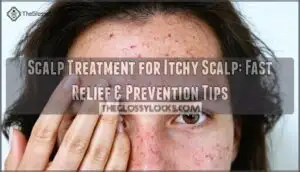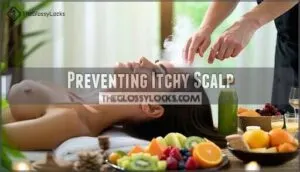This site is supported by our readers. We may earn a commission, at no cost to you, if you purchase through links.
 Your itchy scalp doesn’t have to control your day. Effective scalp treatment for itchy scalp starts with identifying the root cause, whether it’s dandruff, seborrheic dermatitis, psoriasis, or product sensitivity.
Your itchy scalp doesn’t have to control your day. Effective scalp treatment for itchy scalp starts with identifying the root cause, whether it’s dandruff, seborrheic dermatitis, psoriasis, or product sensitivity.
You’ll find relief through targeted approaches like medicated shampoos containing zinc pyrithione or ketoconazole, gentle tea tree oil treatments, and proper scalp hygiene.
For persistent issues, prescription antifungals and topical corticosteroids can break the itch-scratch cycle. Home remedies like scalp massages and avoiding harsh chemicals also help restore balance.
The key is matching your treatment to your specific trigger for lasting results that go beyond temporary fixes, using methods like medicated shampoos and ensuring proper scalp hygiene to achieve a healthy scalp, and considering topical corticosteroids as a solution.
Table Of Contents
Key Takeaways
- Identify your specific trigger first – You’ll need to determine if it’s dandruff, seborrheic dermatitis, psoriasis, or product sensitivity before choosing treatments, since what works for fungal issues won’t help autoimmune conditions.
- Start with medicated shampoos containing zinc pyrithione or ketoconazole – These target the most common causes like Malassezia fungal overgrowth and can provide relief within weeks when used consistently.
- Don’t overlook gentle daily habits – You’ll prevent future flare-ups by using sulfate-free products, doing regular scalp massages, managing stress levels, and avoiding harsh chemicals that disrupt your scalp’s natural balance.
- See a dermatologist if symptoms persist beyond two weeks – You’ll need professional evaluation for prescription treatments like topical corticosteroids or oral medications when over-the-counter options aren’t breaking the itch-scratch cycle.
Itchy Scalp Causes
Understanding what’s causing your itchy scalp helps you choose the most effective treatment approach. Common culprits include dandruff, seborrheic dermatitis, psoriasis, eczema, folliculitis, lichen planus, and head lice infestations.
Dandruff and Seborrheic Dermatitis
What causes that persistent scalp itch that drives you crazy? Dandruff and seborrheic dermatitis stem from Malassezia overgrowth disrupting your scalp microbiome, triggering inflammatory response and excess sebum production.
Stop scratching—your scalp’s microbiome is crying for help when fungi take over and inflammation flares up.
- Dandruff shampoo with zinc pyrithione controls fungal growth
- Scalp inflammation responds to anti-yeast treatments like ketoconazole
- Cradle cap in infants represents mild seborrheic dermatitis requiring gentle scalp treatment
Psoriasis and Eczema
Beyond dandruff, psoriasis and seborrheic eczema create stubborn scalp inflammation that resists typical treatments.
You’ll notice thick, silvery scales with psoriasis or greasy, yellowish flakes with eczema.
The autoimmune connection makes these conditions particularly challenging to manage.
| Condition | Key Symptoms | Treatment Resistance |
|---|---|---|
| Scalp Psoriasis | Thick silvery scales, red patches | Moderate to high |
| Seborrheic Eczema | Greasy yellow flakes, irritation | Variable response |
These eczema triggers and psoriasis symptoms require targeted scalp psoriasis treatment approaches.
Lichen Planus and Folliculitis
Lichen Planus creates small purple bumps on your scalp that can cause permanent hair loss if left untreated.
These inflammatory lesions differ from Folliculitis, which appears as pus-filled bumps around hair follicles caused by bacterial infections.
Lichen Symptoms include flat-topped bumps, while Folliculitis Causes stem from bacteria or fungi.
Treatment Differences involve topical steroids for lichen planus versus antibiotics for folliculitis, with varying Scarring Potential requiring targeted scalp treatments.
Itchy scalp can sometimes mean new hair is growing, which may indicate hair growth.
Head Lice and Other Infestations
Head lice are tiny insects that feed on human blood, causing intense itching and sores from scratching.
These tiny blood-sucking parasites turn your scalp into their personal feeding ground, leaving behind relentless itching and irritation.
These parasitic diseases spread through direct contact, making lice prevention challenging in schools and homes.
Identifying bugs requires checking for moving insects or oval eggs near the scalp, as mite infestations and fungal infections can mimic lice symptoms.
Treatment resistance occurs when lice survive standard treatments, requiring prescription medications or specialized lice treatment approaches for effective relief.
Scalp Treatment Options
Treatment options for your itchy scalp range from simple over-the-counter solutions to advanced medical interventions.
Medicated shampoo serves as your first line of defense, with ingredients like ketoconazole and zinc pyrithione targeting fungal overgrowth.
You’ll find topical steroids provide quick relief for inflammation, while oral medications tackle severe cases from within.
Your scalp treatment options expand when standard approaches fall short.
Light therapy offers a chemical-free alternative for psoriasis and stubborn dermatitis.
Alternative therapies, including tea tree oil treatments and specialized scalp solutions, complement traditional medicine.
For some, fragrance-free shampoos can substantially reduce irritation.
The key lies in matching your specific condition with the right antiitch scalp solution.
Seborrheic dermatitis responds well to antifungal treatments, while bacterial folliculitis requires antibiotic intervention.
Your dermatologist can prescribe stronger medicated scalp treatment when over-the-counter options aren’t cutting it.
Remember, what works for your neighbor’s scalp irritation remedy mightn’t work for you.
Home Remedies Help
You don’t need expensive treatments to find relief from an itchy scalp.
Simple home remedies using everyday ingredients can effectively soothe irritation and address underlying causes like dryness, excess oil, or inflammation.
Gentle Shampoos and Conditioners
When you’re hunting for itchy scalp treatment, swap out harsh cleansers for gentle shampoos and conditioners.
Look for sulfate alternatives, pH balance, and formulas for ingredient sensitivity. Tea tree oil shampoo offers dry scalp relief, while a scalp soothing serum boosts scalp hydration and reduces residue buildup.
Sensitive scalp care means checking labels and avoiding unnecessary fragrances. Many find relief using shampoos with aloe.
- Sulfate alternatives for mild cleansing
- pH balance supports scalp health
- Tea tree oil shampoo for soothing
Scalp Massage and Exfoliation
After picking the right gentle shampoos, scalp massage steps in as your next ally.
Massage techniques boost circulation, helping nutrients reach hair roots.
Scalp exfoliation removes dead skin, reducing scalp itching.
For enhanced massage, consider using a specialized massage tool.
Try DIY scrubs or choose products designed for exfoliation benefits.
Here’s a quick guide:
| Massage Techniques | Exfoliation Benefits | Product Choices |
|---|---|---|
| Fingertip circles | Removes flakes | Scrub shampoos |
| Palm pressure | Unclogs follicles | DIY scrubs |
| Slow kneading | Soothes itching | Exfoliating gels |
The key to effective scalp care is combining the right massage techniques with proper exfoliation, and selecting the appropriate product choices to address specific scalp needs, such as scalp itching and promoting healthy hair growth through improved circulation.
Dietary Changes and Supplements
Anyone battling scalp itching knows Nutrient Deficiencies and poor Gut Health can sneak up on you.
Try these steps for better scalp care:
- Add oily fish for Omega-3s—great for scalp health.
- Eat berries and leafy greens for Anti-Inflammatory Foods.
- Drink plenty of water—Hydration Importance is key.
- Consider Supplement Options like zinc or biotin.
Stress Reduction and Relaxation
Alongside dietary tweaks, managing stress can help soothe your itchy scalp and calm inflammation.
Mindfulness practices, relaxation techniques, and better sleep quality all support emotional wellbeing and scalp sensitivity relief.
Try deep breathing or meditation to boost scalp calming.
Here’s a quick guide:
| Technique | Benefit |
|---|---|
| Meditation | Stress Management |
| Deep Breathing | Scalp Soothing |
| Yoga | Emotional Wellbeing |
| Sleep Hygiene | Sleep Quality |
| Journaling | Mindfulness Practices |
Medical Treatments Available
If home remedies aren’t enough to calm your itchy scalp, you’ve got several medical treatments to explore.
Your doctor may recommend prescription shampoos, topical creams, oral medications, or light therapy, depending on what’s causing your symptoms.
Topical Corticosteroids and Antifungals
A topical steroid or antifungal medication helps manage itchy scalp and scalp fungal infections.
Here are five things to know:
- Corticosteroid Potency matters—use as directed.
- Watch for Antifungal Resistance with repeated use.
- Master Application Techniques for best results.
- Be aware of possible Side Effects.
- Sometimes, Combination Therapies offer better relief.
Prescription Shampoos and Ointments
If over-the-counter products aren’t cutting it, your doctor might recommend prescription medications like Antifungal Shampoos or Steroid Ointments for scalp eczema remedy or scalp dermatitis treatment.
Prescription strength scalp medications can target stubborn symptoms. Pediatric use is common, but always follow specific application techniques.
These topical steroids and medicated shampoos offer relief when standard options fall short, restoring comfort fast. Many people find relief with specialized shampoo products.
Oral Medications and Injections
If prescription shampoos and ointments aren’t enough for stubborn scalp problems, oral medications and injections may step in.
Systemic corticosteroids and immunosuppressants bring scalp inflammation relief for severe cases.
Biologic injections help when autoimmune diseases or psoriasis are tough to treat.
Antihistamine options work for itch, while oral antifungals and antibiotics clear up infections that topical scalp medications can’t handle.
Light Therapy and Other Treatments
When scalp pruritus just won’t quit, light therapy and laser treatments can offer relief.
These scalp treatments reduce inflammation and treat stubborn scalp conditions.
Stem cells and microneedling boost healing, while scalp cooling helps ease irritation.
Always talk with your doctor before starting scalp therapy, since every head’s a different puzzle regarding scalp inflammation relief.
Preventing Itchy Scalp
You can keep your scalp itch-free by focusing on daily care, choosing gentle products, and managing stress.
Simple steps like washing regularly, avoiding harsh chemicals, and eating balanced meals help prevent irritation and discomfort.
Scalp Care and Hygiene
A solid scalp care routine starts with adjusting your washing frequency—too much can dry things out, too little leads to buildup.
Product selection matters; pick gentle formulas that keep scalp pH balance in check.
Don’t skip scalp massage or gentle exfoliation, both boost circulation and remove dead skin.
Using a quality shampoo for relief can soothe irritation.
Sun protection also helps prevent scalp irritation and supports overall scalp hygiene and health.
Avoiding Irritants and Allergens
Ever wondered why your scalp suddenly itches after trying a new shampoo?
Product ingredients like Paraphenylenediamine, propylene glycol, and Cocamidopropyl betaine can trigger allergic reactions.
Patch testing helps spot Fragrance Sensitivity, so switch to hypoallergenic products or dye alternatives.
Watch for methylisothiazolinone in labels. Choosing simple, fragrance-free formulas is the safest bet for sensitive scalps.
Maintaining a Healthy Diet
What you eat affects your scalp’s health more than you might realize.
Nutritional deficiencies can trigger skin conditions and worsen existing scalp problems. Focus on balanced meals rich in anti-inflammatory foods like fatty fish, leafy greens, and berries.
Proper hydration importance can’t be overstated—drink plenty of water daily.
Support gut health with probiotics and fiber-rich foods, as your digestive system impacts skin health throughout your body.
Consider incorporating omega-3 rich foods to reduce inflammation and promote overall wellness.
Reducing Stress and Promoting Relaxation
Chronic stress triggers inflammatory responses that worsen scalp conditions like dandruff and psoriasis.
Managing stress through mindfulness practices, meditation techniques, and relaxation exercises helps break this cycle.
Better sleep hygiene supports scalp health by regulating hormones and reducing inflammation.
Try deep breathing, yoga, or progressive muscle relaxation to calm your mind and soothe your scalp naturally.
Frequently Asked Questions (FAQs)
What do dermatologists recommend for an itchy scalp?
Like old-fashioned apothecaries once prescribed, dermatologists recommend medicated shampoos containing zinc pyrithione or ketoconazole for fungal causes. They’ll suggest topical steroids for inflammation and antihistamines for allergic reactions.
How often should I wash itchy scalp?
For itchy scalp, wash every other day or daily if you’re experiencing severe symptoms.
Overwashing can strip natural oils and worsen irritation, while underwashing allows buildup of irritants and oils that trigger itching.
Can weather changes cause scalp itching?
Studies show 25% of people experience regular scalp itching.
Weather changes absolutely trigger scalp irritation through humidity shifts, temperature fluctuations, and seasonal dryness that disrupts your scalp’s natural moisture balance, causing uncomfortable itching episodes.
Is scalp itching hereditary or genetic?
Yes, scalp itching can have genetic components.
You’re more likely to experience certain scalp conditions if they run in your family, particularly autoimmune disorders like alopecia areata and inflammatory conditions like seborrheic dermatitis.
When should I see a dermatologist?
While home remedies help mild irritation, persistent itching beyond two weeks warrants professional evaluation.
You’ll need dermatological assessment if over-the-counter treatments fail, hair loss occurs, or severe symptoms like bleeding develop.
Can tight hairstyles worsen scalp itching?
Yes, tight hairstyles can definitely worsen scalp itching.
They create tension on hair follicles, restrict blood flow, and can cause inflammation.
This leads to irritation, especially if you’re already dealing with scalp sensitivity or conditions like dandruff.
Conclusion
Sure, this won’t work without proper identification first. Finding effective scalp treatment for itchy scalp depends on targeting your specific trigger.
Whether it’s dandruff, dermatitis, or sensitivity, you’ve got proven options from medicated shampoos to prescription treatments.
Combine targeted therapy with gentle care habits, stress management, and proper hygiene. Remember, persistent itching needs professional evaluation.
With the right approach, you’ll break the itch cycle and maintain lasting scalp health.









